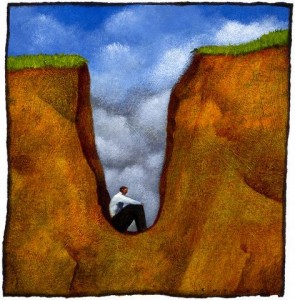 by Scott Cairns
by Scott Cairns
Probably the most frustrating thing about Christians these days is that their theology is so often far from Christian. There are, admittedly, a fair number of world religions whose take on the past, present and future might be summarized by
“As it is written, so shall it be.”
This may come as news to some — maybe even news to some Christians — but Christianity is not one of those religions.
If you were to pay attention only to those Christians who make the news during a typical election cycle, you might not appreciate the heresy of the disposition.
Like most folks, I was initially amazed and deeply chagrined by the appalling ignorance manifested recently by one candidate’s averring,
“Even when life begins in that horrible situation of rape, that is something that God intended to happen.”
How does such a deep misunderstanding develop? What does such an error say about evil, about human responsibility? What does such a regrettable ignorance say about how the future comes to be?
How can a person of faith be so ill-informed as to suppose that everything that happens is God’s will, or that the God is implicated in every disaster, every crime, every evil on the face of the earth?
His ways are not our ways — true enough — but I am not convinced that our every disaster or tragedy or accident is rightly attributed to be one of His inexplicable ways.
On the other hand, one of the reasons I am convinced that the future is not yet written is that I have a keen sense that everything we do matters. I have a very keen sense that my own life — and that every life — is not simply a script to be followed.
In his book about the life and witness of his own spiritual father, Saint Silouan the Athonite, Archimandrite Sophrony — a modern-day ascetic of Mount Athos — further recovers for us this ancient and profoundly Christian understanding when he writes:
Sin is committed first of all in the secret depths of the human spirit but its consequences involve the individual as a whole. … Sin will, inevitably, pass beyond the boundaries of the sinner’s individual life, to burden all humanity and thus affect the fate of the whole world. The sin of our forefather Adam was not the only sin of cosmic significance. Every sin, manifest or secret, committed by each one of us affects the rest of the universe.
What we do — and what we fail to do — actually matters.
The very heart of an efficacious faith, it seems to me now, is bound up precisely in our living into this mystery of the God’s continuing invitation for our collaboration. The very heart an efficacious faith is tied to our accepting that invitation.
From Adam’s naming of the animals through each successive patriarch, prophet, and holy man or woman, the God has shown a predilection for working with His people, as opposed to simply working on them. The God is intent, generation after generation, on finding one or more of us to suffer the chore with Him. They may or may not always have been the best specimens — Moses, Abraham, Lot, David, etc. — but their success is inevitably dependent upon their complying with His will, and their colluding with it.
One chief instance that comes to mind is illustrated in the dialogue that accompanies the Gospel event we call the Annunciation — that most curious exchange between the Archangel Gabriel and the Theotokos — and I glimpse in that fascinating give and take the Holy Mother’s necessary concurrence with the angelic messenger’s announcement. The angel reveals to her the message from on high, and she replies,
“Behold the maidservant of the Lord!” She replies, “Let it be to me according to your word.”
The point is, she said yes. The point is, she was free to say no.
